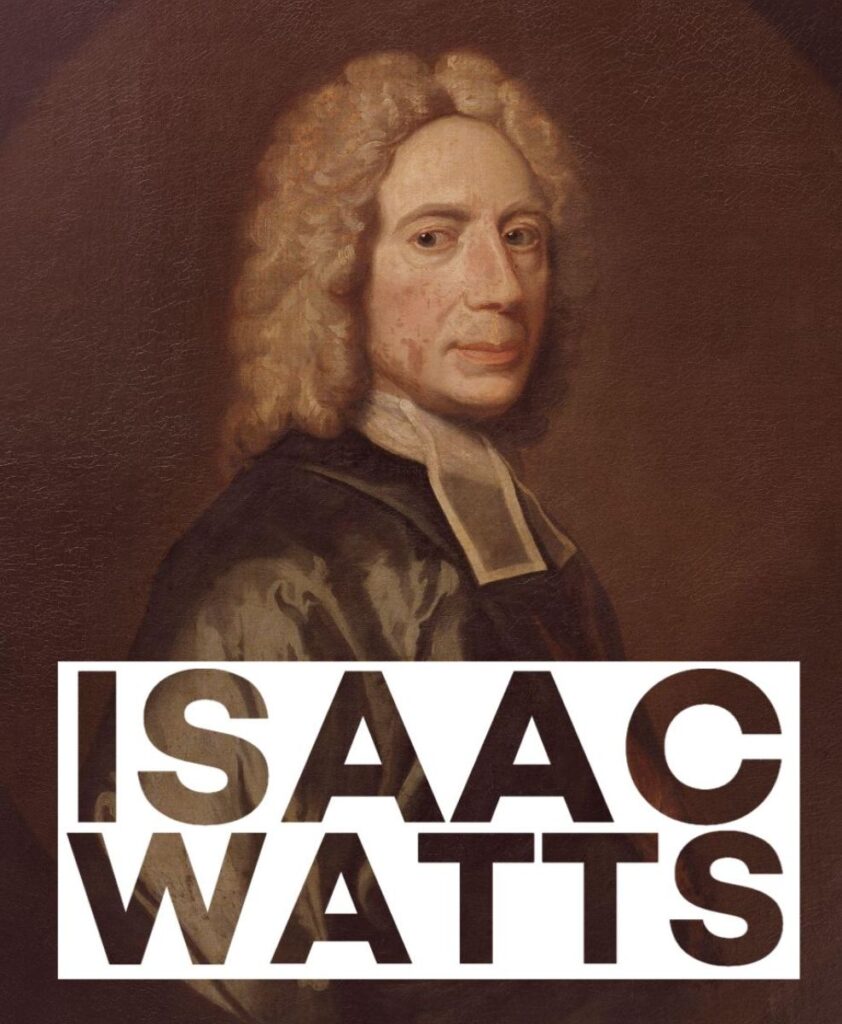See from His head, His hands, His feet, Sorrow and love flow mingled down! Did e’er such love and sorrow meet, Or thorns compose so rich a crown?” Issac Watts.
Isaac Watts (1674 – 1748) was born in Southampton during a tumultuous time. Eleven years before his birth the bubonic plague swept through London (nearly wiped out the town of Southampton), and a year after the Great Fire of London leveled parliament which had a massive impact on Britain. But these disasters were not the only challenges facing this nation, political unrest was present with monarchs pushing for unity between church and state. In 1662, the Act of Uniformity Act was passed, and when it was implemented it forced ministers to be licensed and be subjected to the monarch who was the supreme head under the Church of England, or sent to prison. This act sent Isaac Watts’s father to prison and many others (i.e. John Bunyan) who did not agree with the Uniformity Act. These people who opposed the Act of Uniformity were called Nonconformists.
When Watts was born, his father was facing his second term of imprisonment for not conforming to the Act. Watts’s mother would visit her husband, she would sit on a mounting block outside the prison, and nurse him while chatting with his father between the bars. When his father was not in prison he rigorously taught his nine children. Through his teaching, he taught them not to hate the authorities, educating them that God has a plan for all people, and in the midst of adversity to be faithful to the Word.
Poetry played a big part in the Watts family and they saw it as an essential part of their family’s education in addition to biblical worship. One evening during their family worship Watts spotted a mouse climbing up the bell rope and laughed. After his father rebuked him and asked why he was laughing Watts responded “the mouse for want of stairs ran up the rope for prayers.” Noticing the gifting of the young lad, the family encouraged him to keep up with his poetry and to put it on paper. Noticing his grasp of language through poetry, Watts’s father taught him Latin at the age of four, which would serve him well as a young man who went on to master Greek, Hebrew, and French.
When it came time for Watts to attend school, he held similar convictions to his father and did not want to be affiliated with the Church of England. Watts was offered by many wealthy townspeople to pay for his education at Oxford or Cambridge, which would have led him into Anglican ministry. Rejecting these offers, Watts at the age of 16, went to London to study at a leading Nonconformist academy in Stoke Newington in 1694.
In 1702, he became pastor of a congregational church in London. At the Mark Lane Chapel, one of the city’s most influential independent churches, but the following year, he began suffering from psychiatric and physical illnesses that would plague him for the rest of his life. Due to his recurrent ill health, he was not able to preach regularly because of grievous bodily affliction, a serious nervous system condition, and insomnia. Watts was forced to resign his pastorate at Mark Lane in 1712. Sadly, his illness and appearance (Watts is noted as not being a handsome man) all took a toll on his personal life. Elizabeth Singer was greatly attracted to Watts as a poet but struggled with his appearance, so when he later proposed to her, she responded with, “Mr. Watts, I only wish that I could say that I admire the casket [his appearance] as much as I admire the jewel [his mind and heart].”
In 1712 he had been invited to spend a week at the home of Sir Thomas Abney in Hertfordshire. He enjoyed himself so much there that ended up staying there for the rest of his life, so he could devote himself to writing. Lady Abney and her daughter took great care of Watts, which allowed him to write and compose. Sir Thomas died eight years after Watts became a resident under his roof and care, and Lady Abney survived Watts for some twelve months. Watts died in Stoke Newington in November 1748.
While Isaac Watts is often recognized for his hymns, people do not know that he was more than a poet. Watts was also a scholar of wide reputation, he wrote nearly 30 theological treatises; essays on psychology, astronomy, and philosophy; three volumes of sermons; the first children’s hymnal; and a textbook on logic.
If you desire to learn more about Isaac Watts, read some of his hymns (history shows that he wrote approximately 750 hymns!) and get a glimpse into the mind of a man whom God used to impact many. To complement his hymns, a recommended reading would be his A Guide to Prayer which is a helpful resource in aiding one’s prayer life.
“Call upon God, adore and confess, petition, plead and then declare you are the Lord’s; give thanks and bless And let ‘Amen’ confirm the prayer.” – Isaac Watts.

